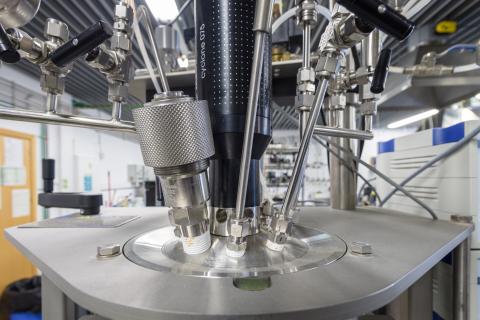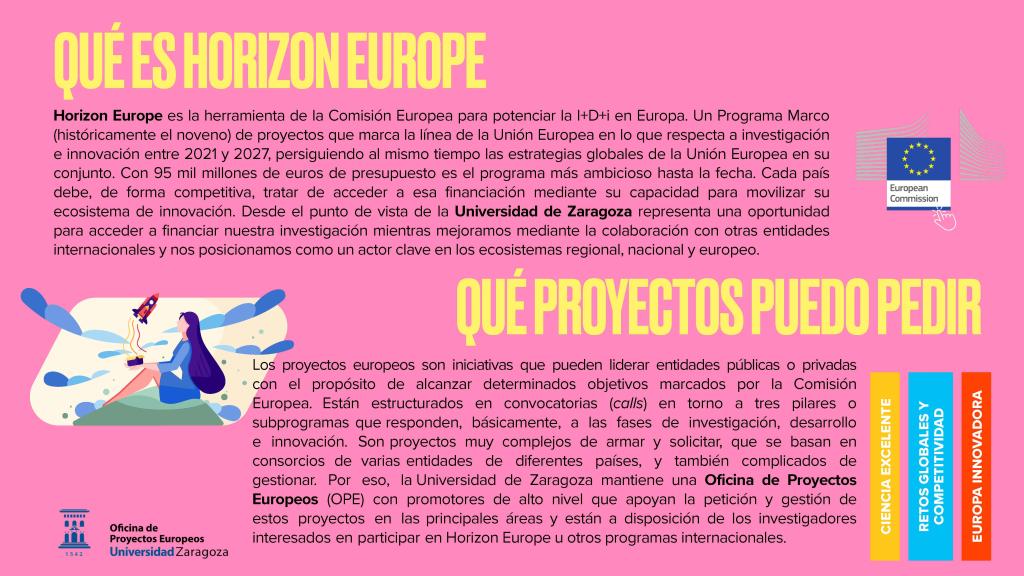El campus público aragonés consigue 3.2 M€ de la Unión Europea para 15 proyectos transfronterizos de España, Francia y Andorra

![]() Los temas a investigar son muy dispares, como la reducción del impacto econímico de los deslizamientos y desprendimientos de ladera; productos cosméticos para mejorar la microbiota de la piel; el diagnóstico de enfermedades neurodegenerativas; la biodegradación de bioplásticos y la seguridad alimentaria de quesos curados, entre otros.
Los temas a investigar son muy dispares, como la reducción del impacto econímico de los deslizamientos y desprendimientos de ladera; productos cosméticos para mejorar la microbiota de la piel; el diagnóstico de enfermedades neurodegenerativas; la biodegradación de bioplásticos y la seguridad alimentaria de quesos curados, entre otros.
Investigadores de ambos lados de los Pirineos participan en consorcios e iniciativas de cooperación para fomentar el desarrollo sostenible del territorio.
Un total de 3.2 millones de euros es el montaje que la Unión Europea acaba de conceder a la Universidad de Zaragoza para el desarrollo de 15 proyectos de carácter transfronterizo con los Pirineos que se desarrollarán a lo largo de tres años a partir de enero de 2024. En esta iniciativa transfronteriza, los investigadores del campus público aragonés participan en consorcios con expertos de ambos lados de los Pirineos y en iniciativas para mejorar la calidad de vida de las poblaciones, potenciar su actividad económica, de innovación y de capital humano y revalorizar el territorio, el patrimonio natural y cultural dentro de una estrategia sostenible e integradora.
Estos proyectos se enmarcan dentro del Programa Interreg POCTEFA 2021-2027, de Cooperación Territorial de la Unión Europea, destinado a reforzar la integración económica y social de esta zona. Los 15 proyectos aprobados tienen un presupuesto de ejecución de 4.9M€, de los cuales 3,2 M€ serán financiados a través de fondos del Fondo Europeo de Desarrollo Regional (FEDER), cubriendo el 65% de la financiación de cada proyecto, según se desprende de la resolución provisional.
La vicerrectora de Política Científica, Rosa Bolea Bailo, ha destacado el alto grado de competitividad del campus público aragonés en este programa europeo. "Nuestra Universidad de Zaragoza demuestra, año tras año, que es capaz de obtener excelentes resultados en una liga internacional muy exigente, en la que solo es posible participar con proyectos de investigación con un elevado grado de excelencia. Además, contamos con un equipo increíble de profesionales en la Oficina de Proyectos Europeos que nos asesora y acompaña a los investigadores en este proceso competitivo, complejo y arduo"
En esta edición los proyectos de investigación concedidos al campus público aragonés incidirán en la mejora de las razas autóctonas bovinas y ovinas; el desarrollo de productos cosméticos para mejorar la microbiota de la piel; avance en el diagnóstico de enfermedades neurodegenerativas; un nuevo diagnóstico de la enfermedad de Lyme; la biodegradación de bioplásticos; aumento de la competitividad de la producción vinícola; prevención de las garrapatas y de los agentes infecciosos que transmiten; inluencia del cambio climático en el aroma de los vinos; mejora de la seguridad alimentaria de quesos curados; sistema inclusivo para una formación dual universitaria de calidad; hub transfronterizo del sector agroalimentario y del agroturismo; creación de una plataforma de intercambio de conocimiento, lucha contra los riesgos transfronterizos tanto naturales como relacionados con actividades humanas; reducción del impacto económico de los deslizamientos y desprendimientos de ladera.
¿Qué es POCTEFA?
Se trata de un programa europeo de cooperación transfronteriza creado para fomentar el desarrollo sostenible del territorio fronterizo de España, Francia y Andorra. El POCTEFA 2021-2027 constituye la sexta generación de apoyo financiero comunitario destinado a reforzar la integración económica y social de esta zona. cofinancia proyectos de cooperación transfronteriza diseñados y gestionados por actores de ambos lados de los Pirineos y de las zonas litorales que participan en el Programa preservando el desarrollo inteligente, sostenible e integrador del territorio. En concreto, en esta primera convocatoria Poctefa 2021-2027 se han aprobado 83 proyectos de los 113 presentados con una financiación global FEDER de 92,8 millones de euros.
El programa fomenta el desarrollo sostenible del territorio fronterizo de España, Francia y Andorra a través de la cooperación transfronteriza. Ayuda a disminuir las diferencias de desarrollo del territorio y a unir fuerzas para lograr un desarrollo sostenible de la región y la cohesión de las regiones que lo forman. En definitiva, el programa, gracias a los fondos europeos, ayuda a mejorar la calidad de vida de los habitantes de la zona.
LISTADO DE PROYECTOS (más información)
1.Proyecto PASTORCLIM. Pilar Santolaria Blasco (IUCA-UNIZAR)
Implementación de un plan de adaptación y mitigación frente a los efectos del cambio climático sobre los sistemas pastorales de montaña mediante la mejora de las razas autóctonas bovinas y ovinas de carne del Pirineo.
2.Proyecto CARUSO. Laura Grasa López (IA2, mixto UNIZAR-CITA, e ISS Aragón)
Cooperación y transferencia para valorizar los recursos naturales y aguas termales del territorio POCTEFA: desarrollo de productos cosméticos para mejorar la microbiota de la piel.
3.Proyecto NEURO-COOP. Rosa María Bolea Bailo/ Alicia Otero (Centro de Encefalopatías y Enfermedades Transmisibles Emergentes- IA2, mixto UNIZAR-CITA)
Cooperación Transfronteriza para la Investigación de Enfermedades Neurodegenerativas. El proyecto NEURO-COOP responde a la necesidad de mejorar el diagnóstico precoz, distinguir entre distintas enfermedades e identificar biomarcadores y terapias.
4.Proyecto NanoLyme. Martín Resano Ezcaray (I3A-UNIZAR)
Hacia unnuevo diagnóstico de la enfermedad de Lyme a través de la nanotecnología, la espectrometría atómica y la inteligencia artificial. La enfermedad de Lyme es endémica en las regiones POCTEFA y su incremento se debe, entre otros factores, al cambio climático que hace que los ventores que la trasmiten se encuentren activos durante más tiempo.
5.Proyecto AcroBioPlast. Víctor Sebastián Cabeza (INMA, centro mixto CSIC-UNIZAR)
Aceleración del pROceso de BIOdegradación de bioPLASTicos para mejorar sus aplicaciones en dispositivos biomédicos. Pretende hacer frente a varios retos relacionados con la mejora en el ciclo de biodegradación de algunos materiales poliméricos de la familia de los poliésteres, centrándose sobre todo en aquellos con aplicación en el campo de la biomedicina.
6.Proyecto OENOPROT. Javier Sancho Sanz (BIFI-UNIZAR)
Nuevas tecnoogías digitales y de proteínas en procesos de vinificación para abordar los retos del sector enológico en el territorio POCTEFA. Acercará las tecnologías avanzadas a las bodegas, y facilitará la transfrencia de soluciones innovadoras y sostenibles de producción vinícola que aumenten la competitividad.
7. Proyecto PYRTICK. Javier Millán Gasca (IA2, mixto UNIZAR-CITA)
Garrapatas y enfermedades transmitidas en el entorno pirenaico: actualización del conocimiento, armonización de su estudio y propuestas de prevención de las garrapatas y de los agentes infecciosos que estas transmiten y así generar en una serie de mapas de distribución, de abundancia y de riesgo presente y futuro para cada una de las especies de garrapata y los patógenos más relevantes.
8.Proyecto CLIMAROMA. Ignacio Ontañón Alonso/ Mónica Bueno Fernández (IA2, mixto UNIZAR-CITA)
Influencia del cambio climático en el aroma de los vinos del territorio POCTEFA: Evaluación y estrategias de adaptación. Este proyecto pretende mejorar los vinos producidos en los territorios vitivinícolas ya existentes en la zona POCTEFA, fomentando la sostenibilidad con el uso de residuos de la industria agroalimentaria.
9.Proyecto TESTACOS+. Rafael Pagán Tomás (IA2, mixto UNIZAR-CITA)
Soluciones innovadoras para la mejora de la seguridad alimentaria de quesos curados producidos y comercializados en el área transfronteriza España-Francia. Tranferencia y adaptación de tecnología de control de los riesgos para la salud relacionados con los microorganismos resitentes a antibióticos y/o productores de histamina en quesos madurados.
10.Proyecto DUAL-Transversalis. Alfredo Berbegal Vázquez (Facultad de Educación)
Pretende crear una red transfronteriza para desarrollar un sistema inclusivo a través de la exploración, desarrollo y consolidación de una formación dual universitaria de calidad. Responder al reto de la cohesión territorial reforzando la cooperación entre universidades, escuelas superiores y tejido socioeconómico y profesional en el amrco de los programas de Aprendizaje a lo Largo de la Vida.
11.Proyecto FOR-Alimenta. Iva Marques Lopes/Marta Fajó-Pascual (Facultad de Ciencias de la Salud y del Deporte-IA2, mixto UNIZAR-CITA)
Creación de un hub transfronterizo de productores, distribuidores,chefs, estudiantes y profesionales del sector agroalimentario y del agroturismo en los Pirineos. Creación de redes transfronterizas que faciliten un acceso igualitario a la educación y a la formación y que faciliten compartir el conocimiento, las buenas prácticas y los servicios, como por ejemplo una plataforma de distribución compartida.
12.Proyecto RIDI PIRINEOS. José Alberto Molina Chueca (IEDIS-UNIZAR)
Red Transfronteriza de I+D+i Pirineos que permita reforzar las capacidades conjuntas a través de una Plataforma de Intercambio de Conoicmento (PIC). La plataforma usará herramientas de análisis de datos e inteligencia artificial para generar convergencias entre oportunidades de innovación empresarial y expertise académica con el fin de desarrollar conjuntamente nuevos productos y servicios.
13.Proyecto EMERTGENTcy. María Pilar Goñi Cepero (IUCA-UNIZAR)
Diagnóstico, eliminación y prevención de antibióticos y otros contaminantes emergentes, bacterias resistentes y genes de resistencia a antibióticos, en el ciclo urbano del agua del territorio POCTEFA. (POCTEFA OUTBIOTICS 2)
14.Proyecto ALERT-PYR. María Consolación Cristina Nerín de la Puerta (I3A-UNIZAR)
Anticipar y Luchar en un Espacio común contra los Riesgos Transfronterizos de los Pirineos. El proyecto tiene como objetivo optimizar las misiones de seguridad civil relativas a la protección de los bienes, las personas y el meido ambiente en los territorios limítrofes entre los departamentos de Alta Garona, Altos Pirineos y Pirineos Atlánticos con Val d'Aran, Aragón, Navarra y Guipúzcoa. De hecho, este territorio está sujeto a muchos riesgos, tanto ntaurales como relacionados con actividades humanas que deben gestionarse de manera común coordinada y compartida.
15.Proyecto SPIRAL. Jesús Guerrero Iturbe (Facultad de Ciencias. Dpto. Ciencias de la Tierra)
(eStrategia PIRenaica de Avisos por movimientos de Ladera). El objetivo de SPIRAL es dismiuir el impacto económico de los movimientos de ladera (deslizamientos y desprendimientos) en los Pirineos Aragoneses, Cataalánes y Franceses ante las importantes pérdidas económicas que originan por cortes en las redes de comunicación y daños en vivienda e infraestructuras hidráulicas.
Los proyectos son cofinanciados al 65% por la Unión Europea a través del Programa Interreg VI-A España-Francia-Andorra (Poctefa 2021-2027). El objetivo del POCTEFA es reforzar la integración económica y social de la zona España-Francia-Andorra
![]() The topics to be investigated are very diverse, such as reducing the economic impact of landslides and landslides; cosmetic products to improve the skin's microbiota; diagnosis of neurodegenerative diseases; the biodegradation of bioplastics and the food safety of mature cheeses, among others.
The topics to be investigated are very diverse, such as reducing the economic impact of landslides and landslides; cosmetic products to improve the skin's microbiota; diagnosis of neurodegenerative diseases; the biodegradation of bioplastics and the food safety of mature cheeses, among others.
Researchers from both sides of the Pyrenees participate in consortia and cooperation initiatives to promote the sustainable development of the territory.
A total of 3.2 million euros is the assembly that the European Union has just granted to the University of Zaragoza for the development of 15 cross-border projects with the Pyrenees that will be developed over three years from January 2024. In this cross-border initiative, researchers from the Aragonese public campus participate in consortia with experts from both sides of the Pyrenees and in initiatives to improve the quality of life of populations, enhance their economic activity, innovation and human capital and revalue the territory, natural and cultural heritage within a sustainable and integrating strategy.
These projects are part of the European Union's Interreg POCTEFA 2021-2027 Territorial Cooperation Programme , aimed at strengthening the economic and social integration of this area. The 15 approved projects have an execution budget of €4.9M, of which €3.2M will be financed through funds from the European Regional Development Fund (ERDF), covering 65% of the financing of each project, according to the provisional resolution.
The Vice-Rector for Scientific Policy, Rosa Bolea Bailo, highlighted the high degree of competitiveness of the Aragonese public campus in this European programme. "Our University of Zaragoza demonstrates, year after year, that it is capable of obtaining excellent results in a very demanding international league, in which it is only possible to participate with research projects with a high degree of excellence. In addition, we have an incredible team of professionals in the European Projects Office who advise us and accompany researchers in this competitive, complex and arduous process"
In this edition, the research projects awarded to the Aragonese public campus will focus on the improvement of native cattle and sheep breeds; the development of cosmetic products to improve the skin microbiota; progress in the diagnosis of neurodegenerative diseases; a new diagnosis of Lyme disease; the biodegradation of bioplastics ; increasing the competitiveness of wine production; prevention of ticks and the infectious agents they transmit; influence of climate change on the aroma of wines; improving the food safety of mature cheeses; an inclusive system for quality dual university education; cross-border hub for the agri-food and agritourism sector; creation of a platform for the exchange of knowledge; combating transboundary risks, both natural and related to human activities; reducing the economic impact of landslides and landslides.
What is POCTEFA?
This is a European cross-border cooperation programme created to promote the sustainable development of the border territory of Spain, France and Andorra. POCTEFA 2021-2027 is the sixth generation of EU financial support aimed at strengthening the economic and social integration of this area. co-finances cross-border cooperation projects designed and managed by actors from both sides of the Pyrenees and coastal areas participating in the Programme, preserving the smart, sustainable and inclusive development of the territory. Specifically, in this first Poctefa 2021-2027 call, 83 projects have been approved out of the 113 submitted with overall ERDF funding of 92.8 million euros.
The programme fosters the sustainable development of the border territory of Spain, France and Andorra through cross-border cooperation. It helps to reduce the differences in the development of the territory and to join forces to achieve a sustainable development of the region and the cohesion of the regions that form it. In short, the programme, thanks to European funds, helps to improve the quality of life of the inhabitants of the area.
LIST OF PROJECTS (more information)
1. PASTORCLIM Project. Pilar Santolaria Blasco (IUCA-UNIZAR)
Implementation of an adaptation and mitigation plan against the effects of climate change on mountain pastoral systems through the improvement of native beef cattle and sheep breeds in the Pyrenees.
2. CHARUSO Project. Laura Grasa López (IA2, mixed UNIZAR-CITA, and ISS Aragón)
Cooperation and transfer to enhance the natural resources and hot springs of the POCTEFA territory: development of cosmetic products to improve the skin's microbiota.
3. NEURO-COOP Project. Rosa María Bolea Bailo/ Alicia Otero (Center for Encephalopathies and Emerging Communicable Diseases- IA2, mixed UNIZAR-CITA)
Cross-Border Cooperation for Research into Neurodegenerative Diseases. The NEURO-COOP project responds to the need to improve early diagnosis, distinguish between different diseases and identify biomarkers and therapies.
4. NanoLyme Project. Martín Resano Ezcaray (I3A-UNIZAR)
Towards a new diagnosis of Lyme disease through nanotechnology, atomic spectrometry and artificial intelligence. Lyme disease is endemic in POCTEFA regions and its increase is due, among other factors, to climate change that causes the ventors that transmit it to be active for longer.
5. AcroBioPlast Project. Víctor Sebastián Cabeza (INMA, joint CSIC-UNIZAR centre)
Acceleration of the BIOdegradation process of bioPLASTicos to improve their applications in biomedical devices. It aims to address several challenges related to improving the biodegradation cycle of some polymeric materials of the polyester family, focusing especially on those with application in the field of biomedicine.
6. OENOPROT Project. Javier Sancho Sanz (BIFI-UNIZAR)
New digital and protein technologies in winemaking processes to address the challenges of the wine sector in the POCTEFA territory. It will bring advanced technologies closer to wineries, and facilitate the transfer of innovative and sustainable wine production solutions that increase competitiveness.
7. PYRTICK Project. Javier Millán Gasca (IA2, mixed UNIZAR-CITA)
Ticks and transmitted diseases in the Pyrenean environment: updating of knowledge, harmonization of their study and proposals for the prevention of ticks and the infectious agents they transmit and thus generate a series of maps of distribution, abundance and present and future risk for each of the most relevant tick species and pathogens.
8. CLIMAROMA Project. Ignacio Ontañón Alonso/ Mónica Bueno Fernández (IA2, mixed UNIZAR-CITA)
Influence of climate change on the aroma of wines from the POCTEFA territory: Evaluation and adaptation strategies. This project aims to improve the wines produced in the wine-growing territories already existing in the POCTEFA area, promoting sustainability with the use of waste from the agri-food industry.
9. TESTACOS+ Project. Rafael Pagán Tomás (IA2, mixed UNIZAR-CITA)
Innovative solutions to improve the food safety of mature cheeses produced and marketed in the Spain-France cross-border area. Transfer and adaptation of technology to control health risks related to antibiotic-resistant and/or histamine-producing microorganisms in matured cheeses.
10. DUAL-Transversalis Project. Alfredo Berbegal Vázquez (Faculty of Education)
It aims to create a cross-border network to develop an inclusive system through the exploration, development and consolidation of quality dual university education. Respond to the challenge of territorial cohesion by strengthening cooperation between universities, colleges and the socio-economic and professional fabric in the field of Lifelong Learning programmes.
11. FOR-Alimenta Project. Iva Marques Lopes/Marta Fajó-Pascual (Faculty of Health and Sports Sciences-IA2, mixed UNIZAR-CITA)
Creation of a cross-border hub of producers, distributors, chefs, students and professionals in the agri-food sector and agritourism in the Pyrenees. Creation of cross-border networks to facilitate equal access to education and training and to facilitate the sharing of knowledge, good practices and services, such as a shared distribution platform.
12. RIDI Pyrenees Project. José Alberto Molina Chueca (IEDIS-UNIZAR)
Cross-border network of R+D+i Pyrenees to strengthen joint capacities through a Knowledge Exchange Platform (PIC). The platform will use data analytics and artificial intelligence tools to generate convergences between business innovation opportunities and academic expertise in order to jointly develop new products and services.
13.EMERTGENTcy Project. María Pilar Goñi Cepero (IUCA-UNIZAR)
Diagnosis, elimination and prevention of antibiotics and other emerging contaminants, resistant bacteria and antibiotic resistance genes, in the urban water cycle of the POCTEFA territory. (POCTEFA OUTBIOTICS 2)
14.ALERT-PYR Project. María Consolación Cristina Nerín de la Puerta (I3A-UNIZAR)
Anticipating and Fighting in a Common Space against the Transboundary Risks of the Pyrenees. The project aims to optimise civil security missions related to the protection of property, people and the environment in the bordering territories between the departments of Haute-Garonne, Hautes-Pyrénées and Pyrénées-Atlantiques with Val d'Aran, Aragon, Navarre and Guipúzcoa. In fact, this territory is subject to many risks, both natural and related to human activities that must be managed in a common, coordinated and shared manner.
15. SPIRAL Project. Jesús Guerrero Iturbe (Faculty of Sciences, Dept. of Earth Sciences)
(eStrategia PIRenaica de Avisos por Movimiento de Ladera). The objective of SPIRAL is to reduce the economic impact of slope movements (landslides and landslides) in the Aragonese, Catalonia and French Pyrenees in the face of the significant economic losses caused by cuts in communication networks and damage to housing and hydraulic infrastructures.
The projects are 65% co-financed by the European Union through the Interreg VI-A Spain-France-Andorra Programme (Poctefa 2021-2027). The objective of POCTEFA is to strengthen the economic and social integration of the Spain-France-Andorra zone




